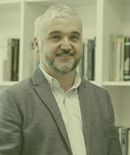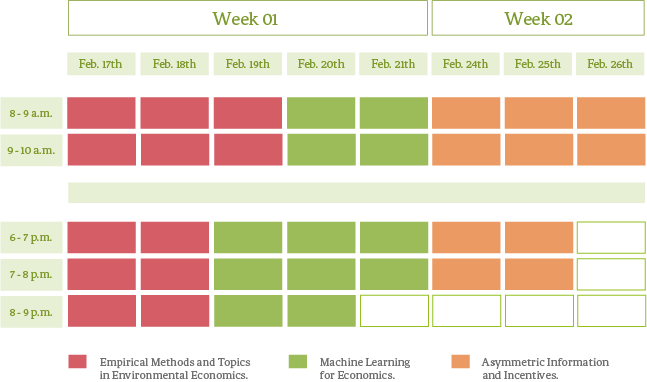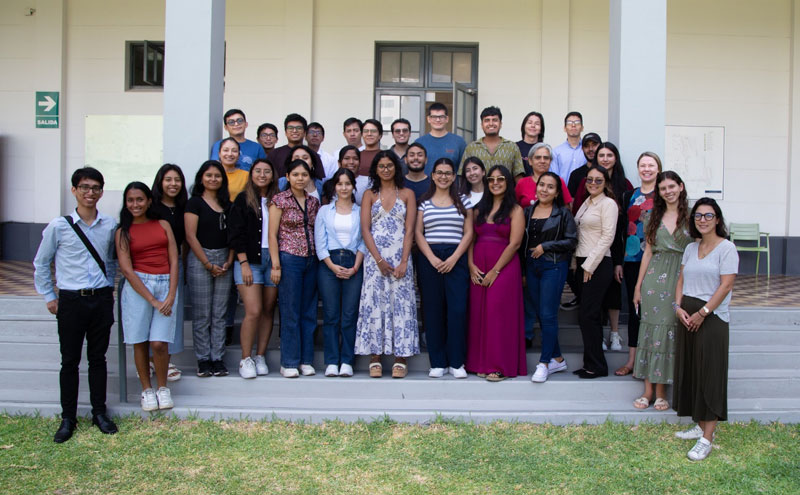February 17th to 19th, 2025
Empirical Methods and Topics in Environmental Economics (12 hours)
This mini-course will survey common empirical methods and topics covered in contemporary environmental economics. Each lecture will pair a method with a topic area. Planned lectures pairs include: introduction to empirical designs in environmental economics, regression discontinuity and environmental policy evaluation, differencing estimators and the health effects of pollution, fixed effects and the impacts of climate change, instrumental variables and permit trading systems, and hedonic methods and natural disasters.
Dr. Patrick Baylis – Vancouver School of Economics
Dr. Patrick Baylis is an Assistant Professor and environmental economist at the Vancouver School of Economics, University of British Columbia (UBC). He obtained his PhD in Agricultural and Resource Economics at the University of California, Berkeley. His research focuses on human responses to environmental challenges such as wildfires, air pollution, and extreme temperatures. Recent projects include evaluating factors affecting home survival during wildfires, analyzing federal wildfire suppression subsidies, and assessing how temperature influences climate-related discussions on social media. His work often involves large datasets, natural language processing, and spatial data, primarily using R.
February 19th to 21st, 2025
Machine Learning for Economics (12 hours)
While traditional machine learning (ML) methods have been developed for prediction problems, in economics we are typically interested in estimation of structural or causal relationships. In this mini course, we will focus on Lasso-based ML methods such as Double/Post-Lasso that were recently developed specifically for the purpose of inference on structural or causal parameters. We will discuss the need for ML methods in empirical work in economics, the statistical properties of Lasso-based methods, and their applications.
Dr. Vadim Marmer Vancouver School of Economics
Dr. Marmer is a Professor at Vancouver School of Economics.
He received his undergraduate and Master’s degrees in Economics from the Hebrew University of Jerusalem, Israel. He worked at the Bank of Israel and taught as an instructor at the Hebrew University before continuing to PhD studies at Yale University in New Haven, USA. He received his PhD in Economics from Yale in 2005.
His main area of research is econometrics, where he has been working on the issues of misspecification, identification, statistical inference for auctions, and nonlinear and non-stationary time series. He has published several scholarly papers including seven papers in Journal of Econometrics, which is a leading scholarly journal in econometrics.
February 24th to 26th, 2025
Asymmetric Information and Incentives: Topics and Applications (10 hours)
In markets, information asymmetries occur when one individual has more or better information than the others. This imbalance can result in significant inefficiencies and even market failures. For example, a firm may be reluctant to participate in a profitable collaborative project with a competitor because of the risks of leaking sensitive information that may affect its competitive position in the market. On online platforms like eBay or Amazon, multiple sellers competing to attract buyers with better information about their tastes may design strategies (such as private discounts or personalized offers) that allow them to extract this information and achieve favorable outcomes while maintaining competition.
This mini-course introduces the students to the concepts of information economics that lie at the heart of modern economics and applies them to the analysis of decision-making and strategic interaction under limited and asymmetric information. We will start with an overview of key tools and concepts and then examine some of their practical applications in the real world. Some of these applications include collusion, business partner selection, and information acquisition and dissemination. The emphasis will be on the role of models in economics and how they can help us understand how information asymmetries affect market outcomes.
Dr. Cristian Troncoso-Valverde – Lima School of Economics
Dr. Cristián Troncoso-Valverde is a microeconomist affiliated with the Institute for Economic Policies at FEN-UNAB, an associate member of the Lima School of Economics and a board member of the Chilean Economic Society (SECHI). He holds a Ph.D. in Economics from the Vancouver School of Economics at the University of British Columbia, where he was supervised by Prof. Michael Peters. His research focuses on mechanism design, strategic management, and applied theory, with recent interests in the strategic use of information and its effects on market competition. Dr. Troncoso-Valverde's work has been published in leading journals in the field, including Economic Theory, the Journal of Economic Theory and the European Journal of Operational Research














